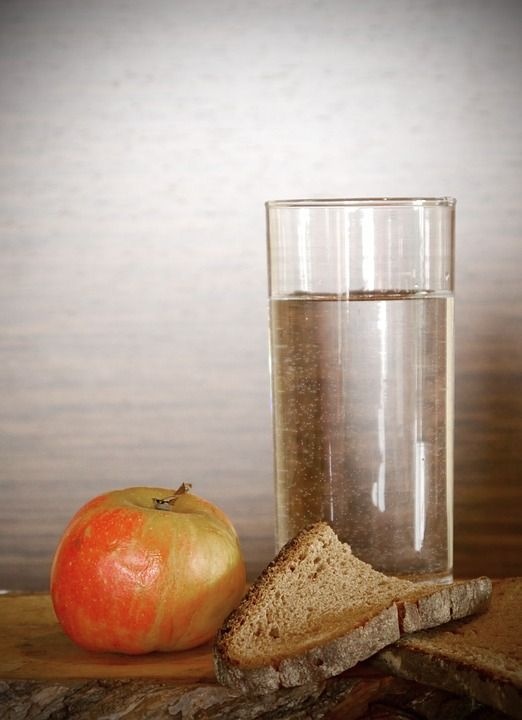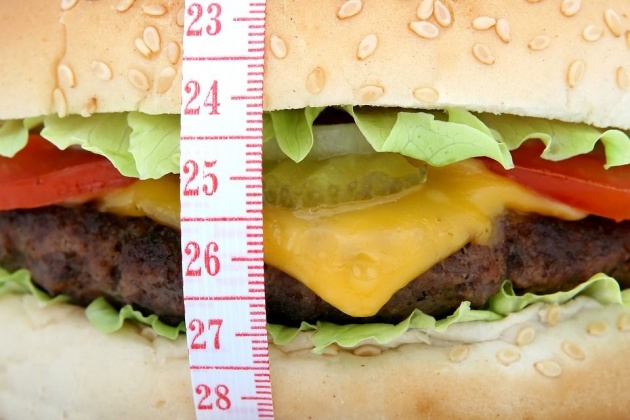Don’t get me wrong, I’m not saying fasting is a bad thing, I only mean it’s so out of this world for me. I’ve never understood this activity before even if I’ve been raised a Catholic.
I went to a Catholic high school and strangely they have never really gotten it into my head. Maybe because we never did any fasting, only some abstinence (like not eating meat during Fridays and the other Holy days)? Or maybe because no one in my immediate family is a fan of fasting or dieting? Not that any of us needs one or the other but still… why has fasting been “absent” in my vocabulary?
 (Photo credit via Pixabay)
(Photo credit via Pixabay)
From what I know, it’s totally different from starving yourself, like how some people do their diet. Some say fasting can be good for our health. Why? They say it’s because doing it will be like cleaning our internal organs and resting them. I also heard about something called water fasting years ago and that it’s being suggested to some people who have certain kinds of sicknesses. Never thought of learning more beyond what I heard.
Ever since the internet existed it was only 3 years ago that I've really thought of finding out just what fasting really is. And because it’s Lenten season again, we Christians should do some soul searching and fasting or abstinence. I’m done with one deep soul-searching during Lent, 8 years ago. Lol. And I always abstain from something all year round but enough about me and fasting. Let's find out more about fasting in general and during the Lenten season.
♣ What is Fasting? ♣
According to Wikipedia:
Fasting is a willing abstinence or reduction from some or all food, drink, or both, for a period of time.
In a physiological context, fasting may refer to the metabolic status of a person who has not eaten overnight, or to the metabolic state achieved after complete digestion and absorption of a meal.
The simplest form of it is when we sleep at night then wake up in the morning, then we will eat breakFAST. There you go.
 (Photo credit via Pixabay)
(Photo credit via Pixabay)
This means fasting and abstinence goes hand in hand. In a religious sense, according to Wikipedia:
Abstinence is meant to elevate the believer beyond the normal life of desire, to a chosen ideal, by following a path of renunciation.
♣ Is fasting the same as starving? ♣
 (Photo credit via Pixabay)
(Photo credit via Pixabay)
Well, the difference is starvation can lead to malnutrition. Starvation is something that a person is not able to control. People suffer from it unwillingly as it happens probably because they are either unable to buy food due to poverty/famine or are unable to reach any form of food or drink, like those stranded somewhere inaccessible or those that are (God forbid) deliberately starved by other people.
 (Photo credit via Pixabay)
(Photo credit via Pixabay)
Prolonged starvation can cause death. Fasting on the other hand is done during a certain period of time only, meaning it is your choice when you will eat or drink anything.
Let's watch a video of the difference between fasting and eating less.
(Video credit: What I've Learned via YouTube)
♣ Types of Fasting ♣
There are different kinds of fasting so I will only mainly write about two of the most commonly used ones and lump the rest into "others".
A. Medical / Diagnostic Fast
 (Photo credit via Pixabay)
(Photo credit via Pixabay)
This type of fast is done when for example we need to have our blood tested for medical purposes. Usually they ask us to fast for 10 to 12 hrs depending on what kind of blood test is required. This is done from dinner up until the morning or lunch. Upon having our blood collected, then we can proceed to consume food and drinks again.
There is also a preoperative fasting done to prevent death during operation due to asphyxiation or what is medically termed as pulmonary aspiration.
B. Religious Fast
As we all know, Christians and Muslims practice fasting due to the religion requiring or suggesting to follow such practices. This is done to be able to reflect on our spirit and focus more on being good people. We abstain or fast because food and drinks can be considered as pleasures of the flesh.
 (Photo credit via Pixabay)
(Photo credit via Pixabay)
Catholic or Christian Lenten abstinence involves not eating meat (for some, even eggs and dairy) as it is considered more pleasurable as opposed to eating fish. Fasting on the other hand is a biblical discipline during Lent in preparation of the holy day of Easter. Saint Augustine's Prayer Book states that fasting means on the forty days of Lent one should not have more than a light breakfast, one full meal, and one half meal.
Muslims on the other hand have Ramadan which involves abstaining from food, drinks, sexual contact and doing bad things during daylight hours. It's purpose is to control impulses and develop good behavior.
 (Photo credit via Pixabay)
(Photo credit via Pixabay)
Let's see what happens to the body during the 30 day Ramadan.
(Video credit: MercifulServant via YouTube)
Aside from Muslims and Christians, other religions also practice this for spiritual advancement. Some include not consuming water too.
Religious fasting is usually done before celebrating a big Holy Day/s like Eid al-Fitr or Easter.
C. Other types of fasting
Water fasting, juice fasting, intermittent fasting and all other types of fasting are also available to be practiced by different people. These are mostly done for medical/health reasons but it can also be used for religious purposes too.
Beyonce is said to have fasted for two weeks and lost 20 pounds for her role in Dream Girls.
 (Photo credit via Pixabay)
(Photo credit via Pixabay)
♣ Why Fast? ♣
Many people swear to the good things gained from a fasting activity. Aside from spiritual benefits, there is also the health benefits.
Medical practitioners advice to do fasting if you include good nutrition before and after the fast. They say it is better to consult a physician first before doing this activity in order to monitor the health condition pre- and post-fasting.
Below are some of the known benefits and exceptions to doing this religious/medical/health practice.
 (Photo credit via Pixabay)
(Photo credit via Pixabay)
- It rests our digestive system.
- Fasting allows the cleansing and detoxification of the body. Although some medically inclined people contest this idea, others still believe it to be true.
- This creates a break in our eating patterns and shines a spotlight on them.
- It promotes greater mental clarity for some people.
- There is a cleansing and healing of "stuck" emotional patterns.
- It leads to a feeling of physical lightness and also of an increase in energy level.
- When you fast, it promotes an inner stillness thus enhancing spiritual connection.
Exemptions:
There are of course exceptions to the rules. Due to certain health reasons, some people are not required to fast at all. Usually those exempted include any or all of the following: people who are invalids or seriously ill, pregnant or breastfeeding women, senior citizens or very young people etc.
Exemptions usually depend on the person's age, gender, health, religion and religious practices.
 (Photo credit via Pixabay)
(Photo credit via Pixabay)
* * * * * * *
I'm sure after one has done fasting, food and life appreciation will be something we will all do. We do not usually appreciate things when it is there and readily available. Only lack of something will make us realize how food, drinks and our life is indeed precious, that much I am sure.
There you have it folks. Now that you know more about it, if you are not one who does it, will you be doing fasting now? I think I'm always doing this because I don't eat regularly sometimes. Lol. Who knows, maybe I am malnourished? Hahahaha. Seriously, if this is beneficial to you, maybe you can share your experience in the comments. ^_^
For my other religious or church related blogs, read below:
- Angels & Demons: A Book Review
- Why “The Passion of The Christ” Is Controversial
- Lent is a Season of Reflection
- Are You Aware That The Golden Rule Sucks?
- The World's Oldest Bamboo Organ is in The Philippines!
If you're not a Bitlanders member yet, sign up and click here
and be appreciated for what you post plus earn extra $$$.
All images are copyright of their respective owners.
Written for Bitlanders by @artgirl. All rights reserved
© Art x Stephanie Rue



